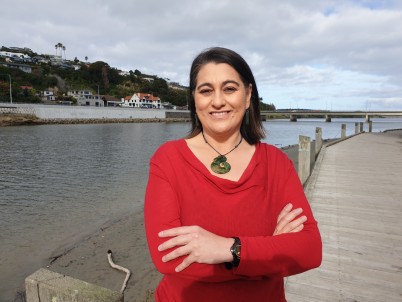The Minister of Health, Hon Andrew Little, today announced $68.3 million in new project and programme grants awarded by the Health Research Council. Here we feature a newly funded research programme led by Dr Amohia Boulton.
The leadership shown by Māori in managing the health and wellbeing needs of their own communities during the COVID-19 outbreak was one of the drivers for newly funded research into a ‘much-needed shift in the health system’.
The Health Research Council of New Zealand (HRC) has just awarded a $5 million programme grant for Māori-led research to explore the change that can occur when Māori have greater influence over health decisions and the opportunity to work in authentic partnership models.
It’s one of four new research programmes announced today with a combined value of nearly $20 million. It’s also the first HRC programme grant awarded to an iwi-owned health research centre – Whakauae Research Services – owned and mandated by Ngāti Hauiti in the southern Rangitīkei district.
Programme Director Dr Amohia Boulton (Ngāti Ranginui, Ngai te Rangi, Ngāti Mutunga, Te Āti Awa o te Waka a Māui) says, “Our research seeks to fundamentally challenge the way in which the health system has sought to achieve equity so far.”
She says the results will provide a Kaupapa Māori-based approach to health systems and models of care that would ideally inform ongoing initiatives for greater equity and Māori leadership in the health sector, such as those announced with the recent health system reforms.
Today, Māori have on average the poorest health status of any ethnic group in New Zealand, evident in the 7.1 year difference in life expectancy between Māori and non-Māori, as well as the difference in mortality rates for cardiovascular disease and cancer.
Based on the belief that Māori must develop and lead their own solutions to bring about system change, Dr Boulton’s team will establish new knowledge on the leadership, governance and decision-making models required for Iwi and Māori to make significant and enduring advances in achieving health equity. Among the programme’s objectives is to also establish whānau and clinical concepts of good practice in the primary healthcare system.
“’Business as usual’, whereby Māori play a role akin to health system advisors, has not worked,” she says. “It’s time for new insights and new evidence to create the conditions necessary to achieve equity and to help Māori flourish.”
She says the COVID-19 experience provided ‘primary evidence’ for how Māori work to protect the health and safety of their communities. “When the pandemic arrived in New Zealand and a state of emergency was declared, the Crown recognised Iwi/Māori were best able to accesss and meet the needs of our own people, and offered up funding for COVID-19 responses with contracting arrangements that largely eschewed the usual prescriptive monitoring and accountability mechanisms.
“The Crown trusted Māori to know their communities and to get what was needed done. Iwi leaders moved incredbly swiftly – they fronted and were trusted by their communities. Messages were delivered in person, and they were very clear.”
The experience added further impetus for change, says Dr Boulton, building on other driving forces such as the Health and Disability System Review and "our own experience and knowledge after working for two decades in health policy and health services research where the message was that the only way we’re going to get change is to have Māori making those decisions on behalf of Māori”.
Whakauae’s research programme draws directly on the priorities outlined by government and the Health Research Council’s committment to achieving health equity. Its aims also align with the Ministry of Health’s vision of Pae Ora (healthy futures for Māori), and builds on the outcomes and priority areas outlined in the recently released Whakamaua: Māori Health Action Plan 2020-2025, which intends to provide clear direction to the Ministry of Health, District Health Boards, whānau, hapū, iwi, and other key stakeholders to improve Māori health.
The Health Research Council’s chief executive, Professor Sunny Collings, says there’s motivation right across the health sector to change health outcomes for Māori, and this programme could answer a need for knowledge to inform implementation of the health sector reforms over the coming years.
“It’s imperative to bring Iwi and Māori voices right to the fore-front of future policies,” she says.
The collaborative, cross-disciplinary team brought together in this programme has a wealth of experience in working alongside Māori communities and co-creating solutions with whānau. And Dr Boulton notes there has never been a better time to do this work.
“There is a momentum, there is a real desire for change among Maori and non-Māori to really address the issue of inequity of health outcomes. It’s like a perfect storm of things coming together and we want to be right in there, boots and all, helping those conversations and those decisions,” she says. “It’s our one chance and so whatever we can do from a research sense to inform the decisions and discussions taking place, we plan to do it.”
The Health Research Council has supported Dr Boulton on her career path starting with an HRC training fellowship, then a Māori Health Research Postdoctoral Fellowship, followed by Project funding, and now the HRC’s most prestigious and highest-value grant.
See below for the full list of 2021 Programme Grant recipients. To read lay summaries about any of these research programmes, go to hrc.govt.nz/resources/research-repository and filter by proposal type ‘Programme’ and year ‘2021’.
2021 HRC Programme Grant recipients
Dr Amohia Boulton, Whakauae Research Services
Kia puawai ake ngā uri whakatupu: flourishing future generations
60 months, $4,999,949
Professor Michael Dragunow, The University of Auckland
Neurovascular pathology in human neurodegenerative disorders
60 months, $4,999,999
Professor Rodney Jackson, The University of Auckland
Vascular risk equity for all New Zealanders
60 months, $4,999,920
Professor Anthony Phillips, The University of Auckland
Translating treatments for lymphatic dysfunction associated with organ failure
60 months, $4,999,761
